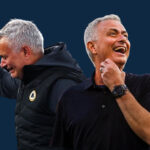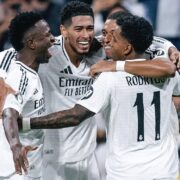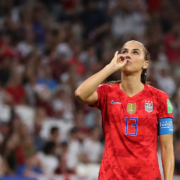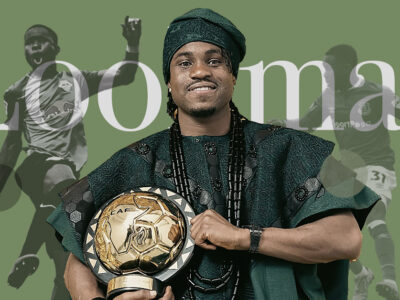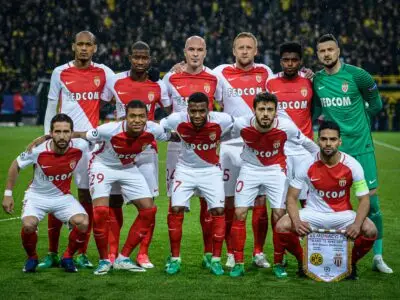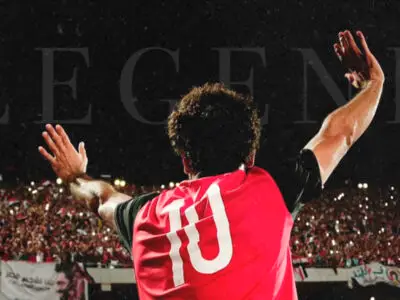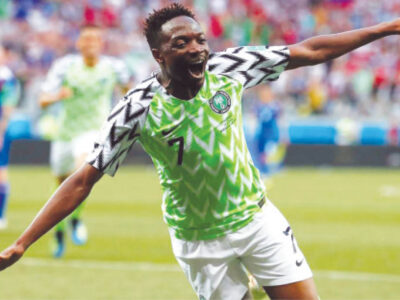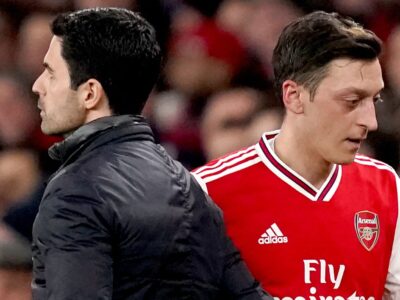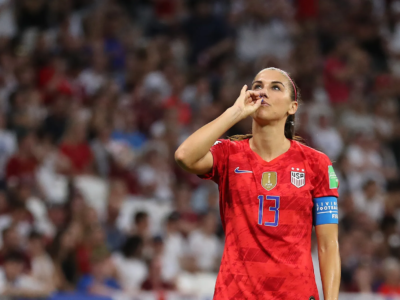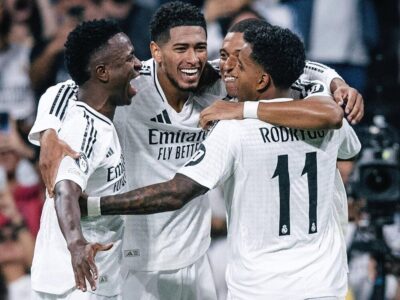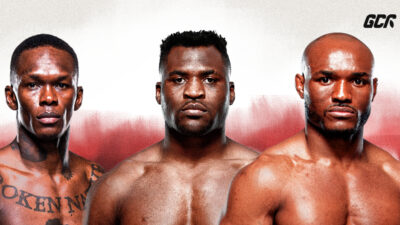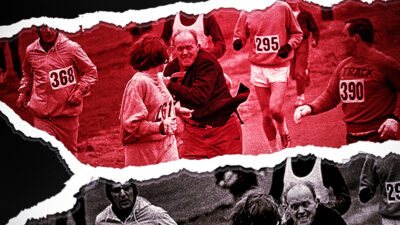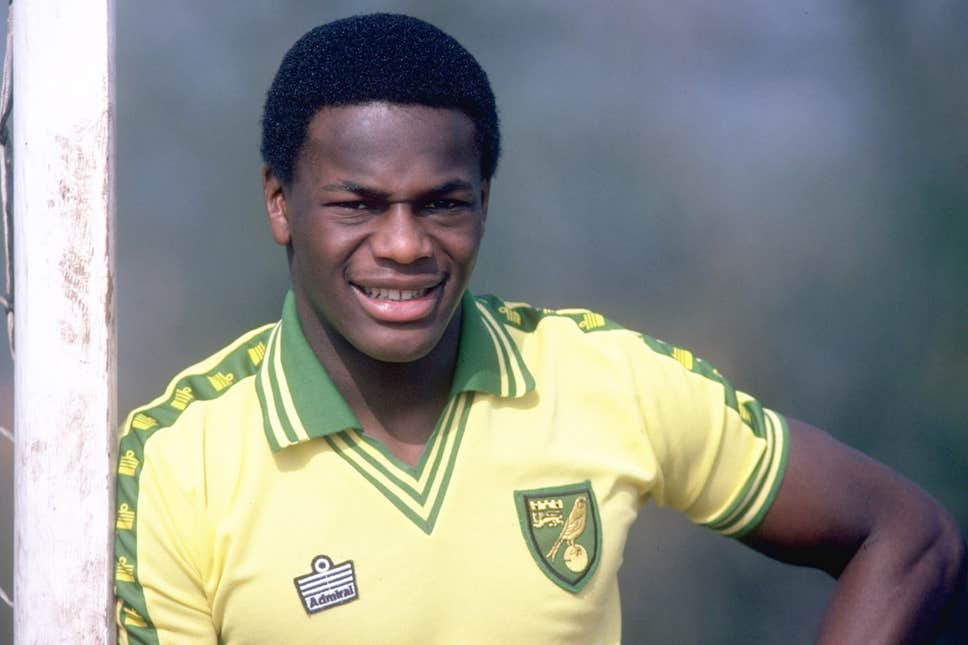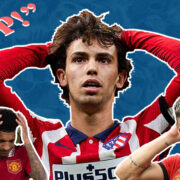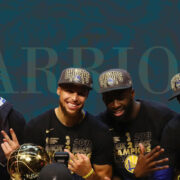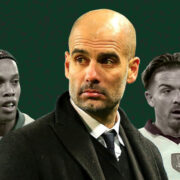Vinicius Junior — the dancing winger — embodies chaos on the pitch with quick feet, sharper instincts, and a smile that disarms defenders and infuriates fans. A storm in white that refuses to settle.
But for all the brilliance he brings to the game, his name has become more than just a fixture on the team sheet. It’s become a lightning rod.
In Spain, he’s become the face of something bigger than football. He’s been booed, jeered, and spat at, sometimes metaphorically, sometimes not.
Vini Jr is to Spain what 2face is to Gotham. To some, he’s the hero football needs; to others, he’s the villain they didn’t ask for. There’s no middle ground.
Why? That’s because Vinicius Junior just won’t shut up and dribble! And so I believe this story should be told. Beyond football, Vinicius’s journey is about defiance, identity, and the fight to be seen for more than just the color of your skin.
“He’s Playing Against Us”
Before the world crowned Vini Junior the prince of Real Madrid, he was the rough diamond that many doubted could ever be polished.
The talent was undeniable — feet quicker than thought, movements that left defenders dizzy — but his decision-making? The less said about it, the better.
Vinicius was wasteful, and no moment better captures this than that night in 2020 in Germany. Borussia Mönchengladbach hosted Madrid in the Champions League, and the Galacticos were trailing by a goal at halftime.
In the shadows of the tunnel, Karim Benzema, the seasoned king of the Madrid attack, leaned in and whispered to Ferland Mendy, “On my mother’s life, he’s playing against us.”
Karim Benzema tells Ferland Mendy not to pass to Vinicius Jr at half-time during last night’s game between Gladbach & Real Madrid: “Brother don’t play to him. On my mother’s life. He is playing against us.” pic.twitter.com/zmpciQRgAV
— Get French Football News (@GFFN) October 28, 2020
Benzema was referring to Vini, and although he tried to be sleek about it, there is nowhere to hide in a Champions League game these days.
And so, these words, caught by the all-seeing cameras, reverberated through the footballing world. Vinicius wasn’t just being criticized; his own teammates were exiling him!
As bad as it sounds, I think Benzema’s brutal remark wasn’t without reason.
On that night against Borussia Mönchengladbach, Vinicius was a whirlwind without direction — speedy? Yes. Skillful? Very, but frustratingly erratic! He squandered possession, misread runs, and delivered crosses that felt more hopeful than intentional.
That infamous accusation exposed the cracks in Vini’s game and his uneasy place in Madrid’s hierarchy at the time.
Becoming the main man
For many, that should have been the end — a young talent swallowed whole by the deadweight of expectation. But for Vini, it was ignition.
From that moment, he didn’t just play to prove himself. He played like a man possessed, desperate to silence doubters, defy critics, and demand respect. The boy who once played “against them” would soon lead them — with goals and a sprinkle of rebellion.
Vinicius Junior’s transformation wasn’t sudden; it was seismic. From raw talent to ruthless finisher, from wayward prodigy to Madrid’s main man, his rise was the stuff of footballing folklore.
The turning point? Paris, May 28, 2022. The UEFA Champions League final against Liverpool.
In a game where the stakes couldn’t have been higher, Vinicius delivered the knockout punch, darting behind Trent Alexander-Arnold and slotting home the winner that sealed Madrid’s 14th European crown. The boy who once played against them had just won it for them!
That goal didn’t just lift the trophy; it lifted the weight of doubt that had followed him. The chaos in his game had matured into controlled fury, his decision-making sharpened by confidence and experience. And as a neutral fan, I loved every bit of it!
No longer the erratic kid Benzema had whispered about, Vinicius had become the weapon Benzema leaned on. He thrived under the Frenchman’s shadow for a time, playing Robin to Madrid’s Batman.
But shadows never hold stars for long. And who doesn’t love an underdog story?
Benzema’s eventual exit the next year cemented Vini’s place at the head of the Galactico hierarchy. The heir apparent became the undisputed king. Goals, assists, swagger — he didn’t inherit leadership; he seized it! We had entered the Vinicius Junior era.
Vinicius the Antagonist
With Vini’s reign came provocation — a lot of it. Yes, he orchestrated chaos with every electrifying run and audacious dribble.
But there was something else. His celebrations, mainly his samba-infused dances, have become flashpoints, igniting opponents’ and supporters’ tempers. Critics misinterpret his jubilant expressions as taunts, overlooking the cultural significance and personal joy they embody.
In September 2022, a storm of controversy swirled around Vinicius’s dancing celebrations, culminating in a Madrid derby against Atlético Madrid.
The buildup was charged, with debates raging across Spain about whether he would dare to dance if he scored. Even Koke, Atletico’s captain, warned him against channelling his inner sambista.
Unfazed, Vinicius remained steadfast, declaring, “I am not going to stop.”
@dailymailsport Vinicius Jr and Camavinga dance in celebration after scoring against Braga 🕺(@Aitor Ortiz) #dailymailsport #dailymail #sports #football #soccer #championsleague #ucl ♬ original sound – Daily Mail Sport
True to his word, when Real Madrid found the net, Vinicius and Camavinga danced, a defiant celebration of their heritage and brilliance. Yet, such expressions have, regrettably, been met with vile racist abuse from certain factions of fans — a response for which there is no justification.
“Racism is normal in Spain”
I find it shocking that some figures within Spanish football have insinuated that Vinícius’s conduct provokes such abuse as if his exuberance justifies the racial slurs.
This dangerous narrative not only shifts blame onto the victim but also tacitly condones the inhumane behavior of perpetrators.
And when journalists highlight this problem, it’s easy to think they are exaggerating and chasing the next big headline. Some fans may even feel the focus should be on football and that discussing these issues fuels the racial and social divisions that are becoming more rife today.
But think of these scenarios. Imagine that Atlético Madrid fans hung an effigy of Vinícius from a bridge.
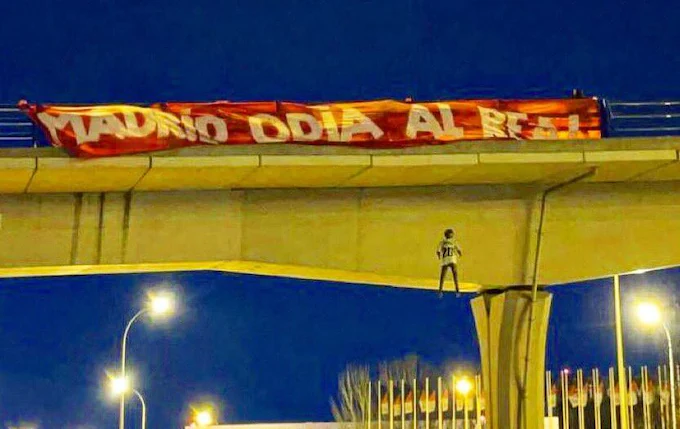
Or that at Valencia, monkey chants echoed from the stands, drowning out the samba rhythm of Vinicius’s game. Your first instinct may be that these are extreme examples of atrocious acts that would never be allowed in the 21st century. But they did happen!
These hostilities felt less like football rivalry and more like something torn from history’s ugliest pages. The former incident happened as recently as January 2023, and the latter led to a temporary suspension of the game at Mestalla Stadium just a few months later.
No support From Spain
Despite these blatant displays of racism, responses from La Liga officials have been inadequate. While the league has filed charges and imposed sanctions in some instances, these measures lack the severity to effect any meaningful change.
When Vini cited these incidents as cracks in Spain’s facade as potential hosts of the 2030 World Cup, there was a lot of blame-shifting. Even his teammates like Dani Carvajal have danced on the edge of that argument, choosing to defend his country’s “honor.”
Meanwhile, La Liga officials offer fines and suspensions that feel more like slaps on the wrist than genuine attempts at reform.
It wasn’t until June 2024 that the first legal charges were filed for racial abuse at a football game in Spain. It’s a narrative as stale as it is sinister — one that shifts blame from bigotry to brilliance.
When all else fails, Spain parades the Williams brothers—Nico and Iñaki—as a convenient shield, pointing to their success as proof that racism in Spanish football is an illusion.
But tokens do not erase truths. Vinicius remains a man playing against both defenders and demons, refusing to bow to a system content to see him dance but not hear his voice.
“I just want to play football”
There are moments in football that transcend the sport — when the crowd’s roar fades, and the world is left staring at something far uglier than the game itself. Vinicius Junior’s tearful press conference was one of those moments.
Eyes red, voice trembling, he spoke not as a superstar but as a human being exhausted by hate.
Yet, instead of empathy, his vulnerability was met with mockery. Social media lit up, not with support, but with cruel jabs, reducing his pain to memes and punchlines.
@fctvofficial Its ok Vini dont cry! 😜😂 #vinijr #vinijr🇧🇷 #balondor #realmadrid #elclasico #fyp #viral ♬ original sound – jbkvisuals
It wasn’t just an attack on Vinicius; it was a reminder of how football often gaslights its Black stars into silence.
Racism in football
Vinicius isn’t alone. Patrice Evra was laughed at when he stood up to Luis Suárez’s racial slurs. Rio Ferdinand has openly spoken about the emotional toll racism has taken on him and his family.
Mario Balotelli, no stranger to monkey chants in Italy, once threatened to walk off the pitch, only to be branded as “weak” by critics.
And Antonio Rüdiger, after enduring abuse in Germany, called out the footballing world’s hypocrisy for its hollow anti-racism slogans and performative gestures.
These men didn’t just play the game; they carried its burdens.
Still, the ugly cycle lingers! Victor Osimhen’s recent fallout with Napoli stemmed not just from a TikTok post from his own club mocking him but from a deeper frustration — one rooted in a culture where minorities are expected to “take in on the chin” rather than demand respect.
Like Vinicius, Osimhen refused to be reduced to caricature, showing that the fight against racism doesn’t pause for convenience.
Football’s greatest shame isn’t just the abuse — it’s the silence that follows it. Vinicius’s tears weren’t weakness; they were defiance. His willingness to speak out proves that the battle isn’t over in a sport where talent is celebrated but humanity is often dismissed.
The Ballon d’Or Saga
But Vini isn’t without his flaws.
Since the start of the 2024/25 season, he carried himself like a man destined for football’s most coveted crown — The Ballon d’Or. After leading Real Madrid to another Champions League triumph, the Ballon d’Or felt less like a possibility and more like an inevitability.
Even with Jude Bellingham dazzling in the same colors, Vinicius had staked his claim — feet quick, goals plenty, and the world at his heels. Madrid believed. Brazil believed. And perhaps Vinicius believed a little too much.
But then came the verdict.
Rodri, Manchester City’s midfield pacemaker, walked away with the golden trophy, and suddenly, the applause turned into an uproar.
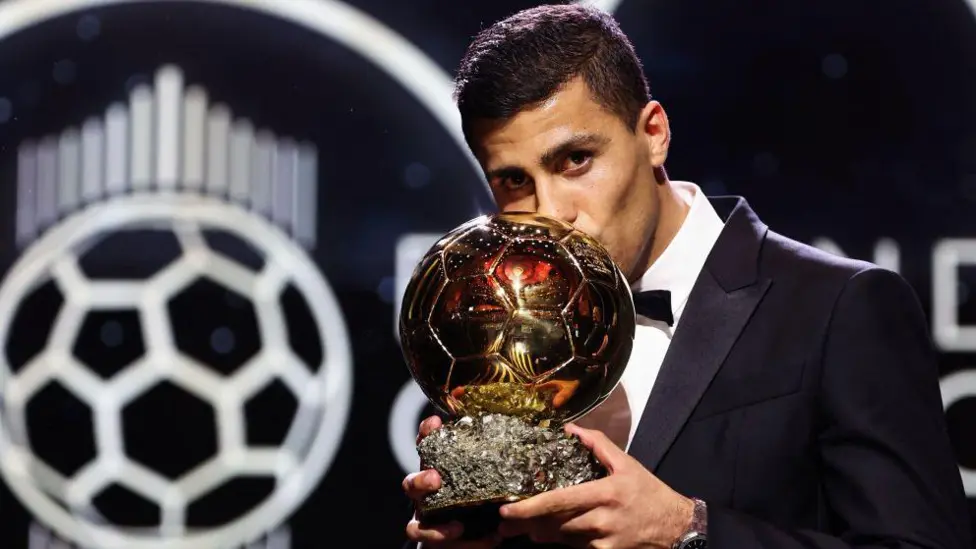
Vinicius and his Real Madrid teammates responded with a fury that felt more like betrayal. Their outrage spilled across social media like a leaky dam. There were a lot of sharp words, bitter tones, and a collective sense of injustice that bordered on arrogance.
Even the Brazil squad and players like Richarlison joined in. In their eyes, it wasn’t just an award lost; it was a robbery committed in plain sight.
For all their talent and triumphs, this reaction was unprofessional. It reeked of entitlement rather than hunger, as though the Ballon d’Or had been promised, not earned.
A Diva in the making
For Vinicius —a player whose rise has been built on resilience— the moment demanded grace. And he failed to show it.
The world saw not a king denied his crown but a prince struggling to wear it.
Vinícius was crowned Best Men’s Player yesterday at the Globe Soccer Awards in Dubai —an honor, no doubt, but one that felt like consolation rather than vindication.
And then came Cristiano Ronaldo, who took the stage with words meant to support but delivered like spite. “It was unfair… they should have given it to Vinicius,” Ronaldo declared, pouring more gasoline on the fire.
It wasn’t a speech; it was a shot across the bow that painted Vinícius not as a player worthy of greatness but as a victim of injustice.
Moments like these are why I believe that to lead, one must rise above the noise, not add to it. For a player who wants to be the face of change, Vinícius must learn that the fight for respect isn’t just won with brilliance; it’s cemented with dignity.
A Role Model for the New Era
At the end of the day, Vinícius Júnior has never been one to fade quietly into the background.
Yes, the Ballon d’Or slipped through his fingers; yes, he could have handled it better. But, most importantly, he didn’t fold. Vinicius Junior is built for spotlights and grand stages, and unlike the Benzema era, he now has an army beside him.
The new Real Madrid front line —Mbappé, Rodrygo, Vinícius, and Bellingham— is more than just a footballing juggernaut.
On paper, this attack is dripping with pace, power, and purpose. But equally as important, their rise on the social front means a lot for the inclusivity that all lovers of football and humanity should support.
The New Galácticos aren’t here to cower and fit in. They are a living, breathing reminder that football belongs to everyone, and every touch they take is a slap in the face to the prejudice that’s tried to keep the sport in chains.
Vinícius is the heartbeat of this rebellion. He isn’t just leading Madrid’s attack — he’s leading a movement— one where talent has no color, and the rhythm of progress never stops.
The boy from São Gonçalo who turned taunts into trophies and jeers into samba steps has danced through hate and dribbled past doubt, and he’s made it clear he’s not done. He won’t shut up. He won’t stop dribbling. And he won’t stop dancing!
Who wrote this?
Precious is a lover of football, a peddler of banter, the master of all sports, and the practitioner of none. He's spent over 15 years discussing football in pubs and schoolyards.








